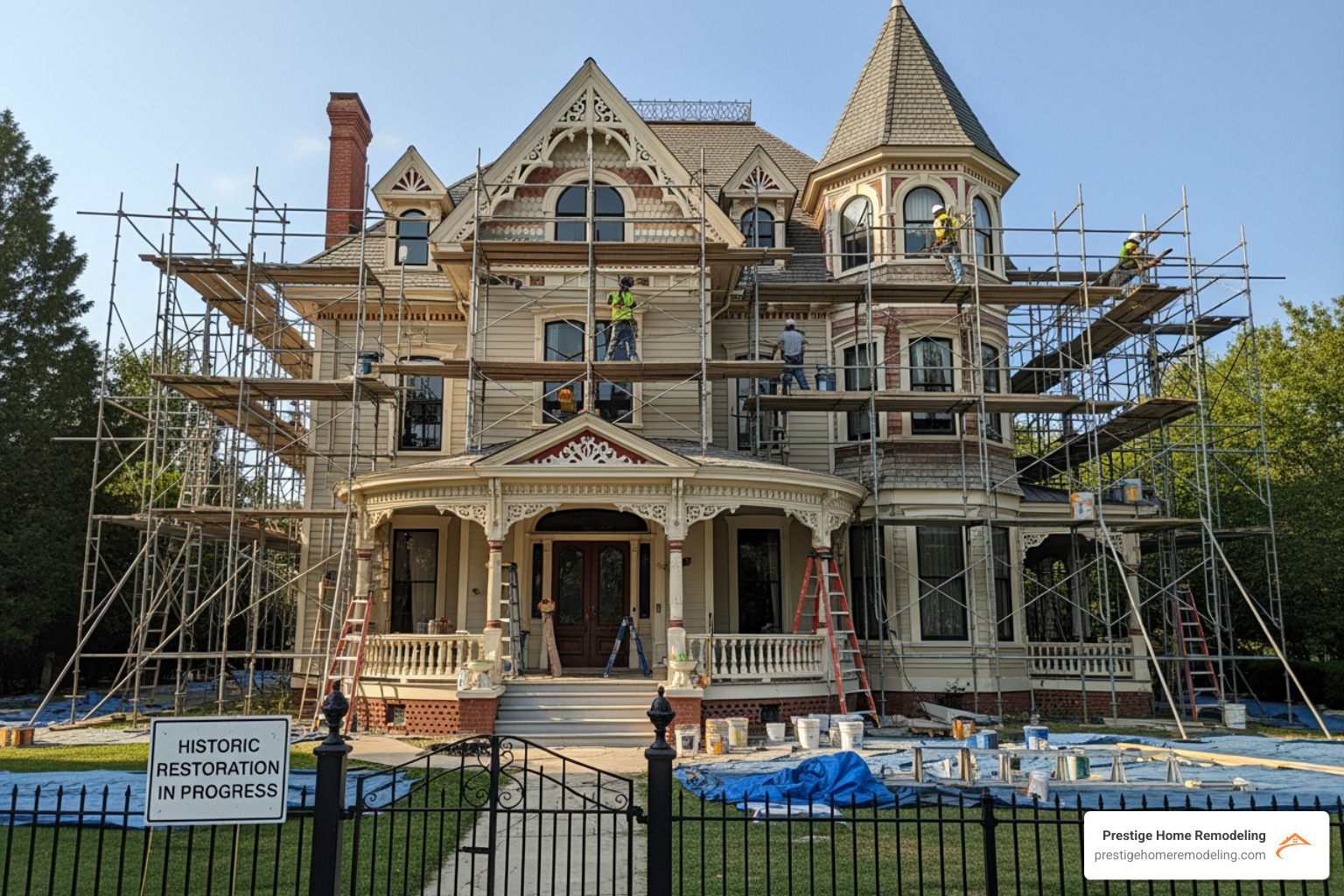Beyond the Hammer: A Guide to Hiring Historic Home Renovation & Restoration Experts
Why Historic Home Renovations Require a Different Approach

How to find contractors for historic home renovations starts with understanding that these projects demand specialized expertise. Here's the streamlined process:
- Start with preservation networks - Contact your State Historic Preservation Officer (SHPO), local historical societies, and preservation organizations for vetted contractor recommendations.
- Verify specialized credentials - Request a Contractor's Qualifications Statement (A305) and confirm at least five years of experience on similar historic projects.
- Check regulatory compliance - Ensure candidates understand local historic preservation guidelines and permitting requirements.
- Review historic-specific portfolios - Examine their work on homes from your property's architectural period.
- Get multiple detailed bids - Compare line-item estimates from at least three qualified specialists, expecting costs between $100-$400 per square foot.
Owning a historic home is a labor of love, offering charm and character that modern construction can't replicate. However, renovating these treasures presents distinct challenges. Historic homes require specialized knowledge of period-specific materials and traditional building techniques. As one preservation expert notes, a lack of understanding can lead to renovations that are "misshapen pieces of modern or Disneyland interpreted traditional architecture stitched together with no clear vision."
The difference between a successful renovation and a costly disaster is finding the right contractor. General contractors may inadvertently cause irreversible damage, violate preservation regulations, or miss hidden issues like asbestos, lead paint, or structural decay common in older homes.
This guide will walk you through the process, from planning to finalizing a contract. I'm Michael Aiello, and with over 30 years of experience designing and building homes in Maryland, I've learned that finding the right historic renovation contractor requires a different approach. At Prestige Home Remodeling, we help homeowners preserve their property's integrity while integrating modern comfort.
Understanding the Specialist: Why You Need a Historic Restoration Expert
Approaching a 150-year-old home requires a different philosophy than a modern build. The materials, techniques, and goals are fundamentally different. This is why finding a true historic restoration expert isn't just a good idea—it's essential for protecting your investment and preserving your home's story.
Historic Restoration vs. General Remodeling
A general contractor is like a family doctor, great for most situations. But for a historic home, you need a specialist. General contractors excel with today's materials and codes, but a historic restoration specialist brings a unique skill set. They understand how period-specific materials like lime mortar and old-growth timber behave. They approach your home with respect for its historical integrity, aiming to preserve and restore rather than simply replace.
| Feature | General Contractor | Historic Restoration Specialist |
|---|---|---|
| Primary Goal | Modernize, update, build new | Preserve, restore, rehabilitate historical integrity |
| Material Knowledge | Contemporary materials, standard finishes | Period-specific materials (e.g., lime mortar, old-growth wood) |
| Technique Expertise | Modern construction, efficiency-focused | Traditional craftsmanship, historical methods (e.g., hand-planing) |
| Regulatory Acumen | General building codes, zoning | Historic preservation guidelines, local ordinances, SHPO requirements |
| Problem Solving | Standard solutions, often replacement | Conservation, repair, replication of original elements |
| Approach to Aesthetics | Current trends, homeowner preference | Historical accuracy, architectural context |
Specialized Services Offered
A historic restoration contractor offers rare skills, including structural repairs using traditional joinery, masonry repointing with period-appropriate lime mortars to prevent damage, and plaster conservation to save original walls and decorative elements. They perform custom millwork replication to create new features that are indistinguishable from the originals and specialize in window and door restoration, preserving historic value while improving performance. They even research period-appropriate paints and finishes. Crucially, they know how to integrate modern HVAC, electrical, and plumbing systems discreetly, without compromising the home's character.
The Risks of DIY and Unqualified Contractors
While the DIY spirit is admirable, historic restoration is one area where good intentions can lead to heartbreaking results. The biggest risk is irreversible damage—once original plaster, woodwork, or windows are gone, they're gone forever. A poorly executed renovation can also decrease your home's value, negating any potential historic tax credits.
Safety hazards and code violations are another serious concern. Older homes often hide outdated wiring, lead paint, or asbestos. An unqualified contractor might miss these dangers, leading to failed inspections and expensive remediation. What starts as a cost-saving measure often becomes far more expensive when mistakes need to be corrected.
When you're ready to ensure your historic home receives the expert care it deserves, we invite you to explore our comprehensive home remodeling services. We understand that how to find contractors for historic home renovations means finding professionals who view preservation as a calling, not just a job.
Phase 1: Planning Your Historic Restoration Project
Successful historic renovations begin with a solid plan, not a contractor search. A thoughtful planning phase saves time, money, and heartache by clarifying your vision before work begins.
Defining Your Project Scope and Vision
Before you start how to find contractors for historic home renovations, you must define your goals. Are you aiming for strict preservation, rehabilitation for modern life, or restoration to a specific period? Identify your non-negotiables, like original floors or a hand-carved staircase, to guide your contractor.
Consider how to integrate modern necessities like an updated kitchen or efficient HVAC without compromising the home's character. Create a detailed project brief with research on your home's architectural style and photos of similar renovated homes. This visual reference is invaluable when communicating with potential contractors.
Navigating Regulations and Preservation Guidelines
If your home is in a designated historic district or on the National Register of Historic Places, you'll need to follow specific guidelines. These rules exist to protect the historical fabric of our communities.
In Maryland, you'll likely work with local historical commissions for approval on modifications. The Maryland Historical Trust, our state's State Historic Preservation Officer (SHPO), is an invaluable resource for guidance, grants, and tax credits. The permitting process for historic homes is more involved, requiring detailed documentation. A contractor experienced with these local ordinances is essential for navigating the process smoothly.
Budgeting for Your Historic Renovation
Historic renovations cost more than standard remodels. Expect to pay between $100 and $400 per square foot, depending on your home's condition and the project's complexity.
Why the higher cost? Material costs are a major factor, as period-appropriate materials often require custom fabrication or sourcing from specialty suppliers. Labor expenses are also higher, as the artisans who can restore plaster or replicate millwork have specialized skills that command higher rates.
Most importantly, you must have a contingency fund of 15-20% of your total budget. Historic homes are notorious for hiding problems like water damage, structural issues, or hazardous materials. This fund isn't extra spending; it's insurance against the stress of unforeseen findies.
While the investment is significant, a properly restored historic home holds its value remarkably well. If you're considering a project and need budgeting guidance, learn more about our custom home building process.
Phase 2: How to Find Contractors for Historic Home Renovations
With your plan and budget in place, it's time for the most critical step: finding the right contractor. This requires tapping into specialized networks, not just scrolling through generic online listings.
Tapping into Preservation Networks
The best way to find exceptional historic restoration contractors is to connect with people who live and breathe preservation.
- Local and State Organizations: Start with your local historical society and the Maryland Historical Trust. These groups often maintain lists of trusted craftspeople who have proven their respect for historical integrity.
- House Museums: Visit a beautifully restored house museum in your area and ask the staff for contractor recommendations. Museum curators are meticulous and can point you toward top-tier professionals.
- Fellow Historic Homeowners: Talk to other owners of older homes in your community. Their experiences are invaluable for finding reliable contractors and avoiding problematic ones. Your neighborhood association in a historic district is also a great resource.

Utilizing Professional and Online Directories
While personal networks are key, professional directories can widen your search.
- Architectural and Preservation Groups: The local chapters of the American Institute of Architects (AIA) and preservation-specific online directories can help you find specialists. Often, the best recommendations come from preservation architects.
- Online Research: When you find potential contractors, dive deep into their online portfolios. Look for projects that match your home's architectural style and period. Read online reviews with a critical eye, paying close attention to comments about work on older properties, understanding of period materials, and navigating preservation guidelines.
When researching how to find contractors for historic home renovations, focus on reliable sources like State Historic Preservation Offices, local preservation groups, and referrals from fellow homeowners. These sources consistently yield contractors who understand your home is a piece of living history.
At Prestige Home Remodeling, we've spent over 50 years combined working on Maryland homes of all ages. We know the right match is about shared respect for what makes your historic home special.
Phase 3: Vetting and Interviewing Your Top Candidates
Now it's time to separate the truly qualified specialists from the rest. This vetting process is about finding a partner who understands and respects your property's unique character.
How to find contractors for historic home renovations by verifying their credentials
Credentials are your first line of defense. A contractor's paperwork reveals their true qualifications.

- License and Insurance: Verify their Maryland state license, liability insurance, and worker's compensation coverage. For large projects, bonding provides an extra layer of protection.
- Specialized Experience: Look for certifications in preservation trades. Request a Contractor's Qualifications Statement (A305), which details their experience and financial health. Insist on at least five years of experience on projects similar to yours.
Reviewing Portfolios and Speaking with References
A portfolio shows what a contractor can do. References reveal how they do it.
When reviewing portfolios, look for detailed examples of projects that match your home's architectural style. Ask to visit a completed project in person to see the quality of craftsmanship up close.
When speaking with references, ask specific questions about communication, responsiveness, budget and timeline adherence, and problem-solving skills. How did they handle unexpected issues like rot or structural problems? The answer reveals their experience and professionalism.
Key Questions to Ask Potential Contractors
Your interview assesses a contractor's philosophy as much as their technical skill. The right candidate will be enthusiastic about your home's period details.
- What is your experience with my home's architectural style (e.g., Victorian, Federal)? Listen for detailed answers that show familiarity with period-specific construction.
- How do you balance preserving historical integrity with integrating modern amenities? Look for creative, respectful solutions.
- What is your process for handling unforeseen problems like rot or lead paint? A seasoned pro will have clear protocols for assessment, mitigation, and communication.
- How do you vet subcontractors to ensure they adhere to preservation standards?
- Are you familiar with our local historic preservation guidelines and permitting process?
The contractor who answers these questions with confidence, specificity, and genuine passion is the one who deserves to be on your shortlist.
Phase 4: Making the Final Decision and Finalizing the Agreement
You've interviewed candidates, checked references, and reviewed portfolios. Now it's time to choose your contractor and formalize the agreement. This is a pivotal moment for your project.
How to find contractors for historic home renovations by comparing bids
When bids arrive, resist the urge to simply pick the lowest number. The cheapest option is rarely the best value for an irreplaceable historic property. Obtain at least three detailed bids from qualified specialists to get a realistic sense of the market.
Request line-item estimates that break down costs for labor, materials, and specific tasks. This transparency allows for a fair comparison. If one bid is significantly lower, find out why. Are they substituting modern materials or skipping crucial prep work? A bargain today can become an expensive repair tomorrow.
Also, consider the intangibles. Which contractor showed genuine passion and communicated clearly? The right contractor is a partner in preserving your home's legacy. For more guidance, see our article on how to choose a remodeling contractor in Maryland.
The Anatomy of a Rock-Solid Contract
No matter how much you trust your contractor, a comprehensive contract is essential to protect both parties. It eliminates confusion and sets clear expectations.

A solid contract should include:
- Detailed Scope of Work: Spell out every task, from demolition to final paint color.
- Payment Schedule: An initial deposit, progress payments tied to milestones, and a final payment. Never pay the full amount upfront.
- Material Specifications: Document the exact materials to be used to ensure historical accuracy.
- Timeline and Milestones: A realistic start date, completion date, and key checkpoints.
- Retainage Clause: Allows you to hold back 5-10% of the total cost until every punch list item is complete.
- Lien Waivers: Documents from subcontractors and suppliers confirming they've been paid, protecting your property from liens.
- Change Order Process: A documented system for approving adjustments to scope, timeline, and cost when surprises arise.
After the Work is Done: Final Steps
Before making the final payment, take these important steps.
- Final Walkthrough: Go through the project with your contractor to create a punch list of any items needing correction or completion.
- Final Payment: Do not release the final payment (the retainage) until the punch list is 100% complete.
- Gather Warranties: Collect all warranty information for materials, appliances, and workmanship.
- Keep Documentation: File your contract, invoices, permits, lien waivers, and photos. This record is invaluable for future maintenance, appraisals, or a potential sale.
Frequently Asked Questions about Historic Home Renovations
Renovating a historic home brings a unique set of questions. Here are answers to some of the most common concerns I've heard from Maryland homeowners over my 30-year career.
How much more does a historic renovation cost compared to a standard one?
Historic renovations typically cost 20-50% more than a comparable modern remodel. This is due to several factors:
- Specialized Labor: Artisans with traditional building skills command higher rates.
- Period-Appropriate Materials: These often need to be custom-made or sourced from specialty suppliers.
- Unforeseen Issues: Hidden problems like rot, outdated wiring, or hazardous materials are common.
As a result, you can expect a cost range of $100-$400 per square foot, depending on your home's condition and the project's complexity.
Can I modernize my kitchen and bathrooms in a historic home?
Yes, absolutely! The key is to do it sensitively. A skilled historic restoration contractor can integrate modern amenities while respecting your home's character. This is often achieved by keeping the room's original footprint and using period-appropriate design cues like cabinetry styles, tile patterns, and hardware that complement the home's architectural era. The goal is to improve functionality and comfort without detracting from what makes your home historically significant.
What's the most common unexpected problem in a historic renovation?
Water damage. Without a doubt, water damage is the most common and destructive surprise we find. Decades of slow leaks from old roofs, plumbing, or foundations can lead to extensive rot and mold hidden behind walls and under floors. This is precisely why a 15-20% contingency fund is crucial for any historic renovation budget. An experienced contractor will have a clear process for addressing these issues efficiently, but some problems only become apparent once demolition begins. This is another reason why hiring a specialist who knows how to find contractors for historic home renovations is so important—they won't be surprised and will know exactly how to handle it.
Conclusion: Preserving Your Home's Legacy with the Right Expert
Your historic home is a living connection to Maryland's past, a testament to craftsmanship that's rarely found today. As its steward, you have the privilege of preserving its story for future generations.
We've walked through how to find contractors for historic home renovations, and the journey underscores one critical point: finding the right expert is the most important step in protecting your home's character. A contractor who respects traditional techniques and materials will be the difference between a successful restoration and a costly mistake. Diligent research, planning, and vetting are essential.
At Prestige Home Remodeling, we have over 50 years of combined experience with Maryland's historic properties. We understand it's about honoring the past while integrating modern comfort. We approach every project with respect, transparent processes, and a commitment to delivering your vision on time and on budget.
Your historic home has stood for decades. With the right partner, it will stand for generations to come.
Ready to discuss your historic home renovation? Explore our services and contact us today.
